NATO is spinning out an entirely new kind of combat it has branded cognitive warfare, Ben Norton reports.
 NATO is developing new forms of warfare to wage a “battle for the brain,” as the military alliance put it.
NATO is developing new forms of warfare to wage a “battle for the brain,” as the military alliance put it.
The U.S.-led NATO military cartel has tested novel modes of hybrid warfare against its self-declared adversaries, including economic warfare, cyber warfare, information warfare and psychological warfare.
 Now, NATO is spinning out an entirely new kind of combat it has branded cognitive warfare. Described as the “weaponization of brain sciences,” the new method involves “hacking the individual” by exploiting “the vulnerabilities of the human brain” in order to implement more sophisticated “social engineering.”
Now, NATO is spinning out an entirely new kind of combat it has branded cognitive warfare. Described as the “weaponization of brain sciences,” the new method involves “hacking the individual” by exploiting “the vulnerabilities of the human brain” in order to implement more sophisticated “social engineering.”
Until recently, NATO had divided war into five different operational domains: air, land, sea, space, and cyber. But with its development of cognitive warfare strategies, the military alliance is discussing a new, sixth level: the “human domain.”
A 2020 NATO-sponsored study of this new form of warfare clearly explained, “While actions taken in the five domains are executed in order to have an effect on the human domain, cognitive warfare’s objective is to make everyone a weapon.”
“The brain will be the battlefield of the 21st century,” the report stressed. “Humans are the contested domain,” and “future conflicts will likely occur amongst the people digitally first and physically thereafter in proximity to hubs of political and economic power.”
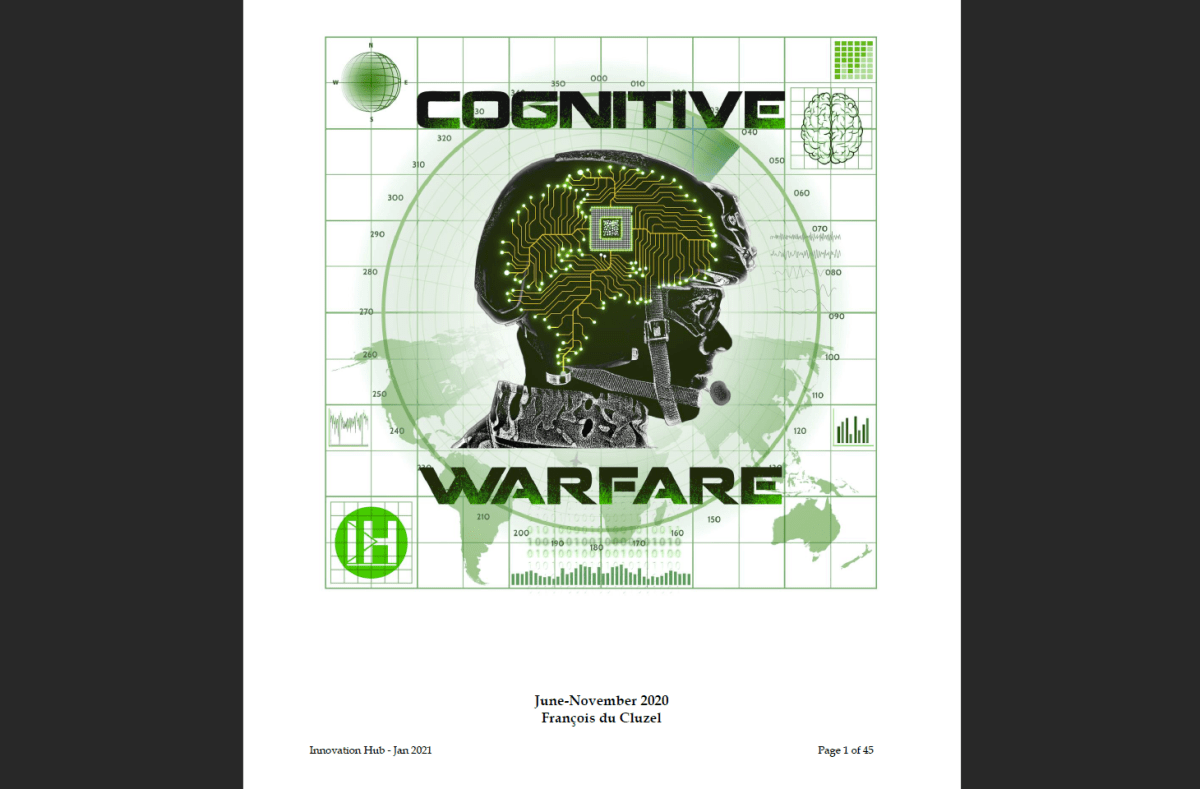
The 2020 NATO-sponsored study on cognitive warfare.
While the NATO-backed study insisted that much of its research on cognitive warfare is designed for defensive purposes, it also conceded that the military alliance is developing offensive tactics, stating, “The human is very often the main vulnerability and it should be acknowledged in order to protect NATO’s human capital but also to be able to benefit from our adversaries’ vulnerabilities.”
In a chilling disclosure, the report said explicitly that “the objective of Cognitive Warfare is to harm societies and not only the military.”
With entire civilian populations in NATO’s crosshairs, the report emphasized that Western militaries must work more closely with academia to weaponize social sciences and human sciences and help the alliance develop its cognitive warfare capacities.
The study described this phenomenon as “the militarization of brain science.” But it appears clear that NATO’s development of cognitive warfare will lead to a militarization of all aspects of human society and psychology, from the most intimate of social relationships to the mind itself.
Such all-encompassing militarization of society is reflected in the paranoid tone of the NATO-sponsored report, which warned of “an embedded fifth column, where everyone, unbeknownst to him or her, is behaving according to the plans of one of our competitors.” The study makes it clear that those “competitors” purportedly exploiting the consciousness of Western dissidents are China and Russia.
In other words, this document shows that figures in the NATO military cartel increasingly see their own domestic population as a threat, fearing civilians to be potential Chinese or Russian sleeper cells, dastardly “fifth columns” that challenge the stability of “Western liberal democracies.”
Please Support CN’s Fall Fund Drive!
NATO’s development of novel forms of hybrid warfare come at a time when member states’ military campaigns are targeting domestic populations on an unprecedented level.
The Ottawa Citizen reported this September that the Canadian military’s Joint Operations Command took advantage of the Covid-19 pandemic to wage an information war against its own domestic population, testing out propaganda tactics on Canadian civilians.
Internal NATO-sponsored reports suggest that this disclosure is just scratching the surface of a wave of new unconventional warfare techniques that Western militaries are employing around the world.
Canada Hosts Cognitive Warfare Event
Twice each year, NATO holds a “pitch-style event” that it brands as an “Innovation Challenge.” These campaigns — one hosted in the Spring and the other in the Fall, by alternating member states — call on private companies, organizations, and researchers to help develop new tactics and technologies for the military alliance.
The shark tank-like challenges reflect the predominant influence of neoliberal ideology within NATO, as participants mobilize the free market, public-private partnerships and the promise of cash prizes to advance the agenda of the military-industrial complex.
NATO’s Fall 2021 Innovation Challenge is hosted by Canada, and is titled “The invisible threat: Tools for countering cognitive warfare.”
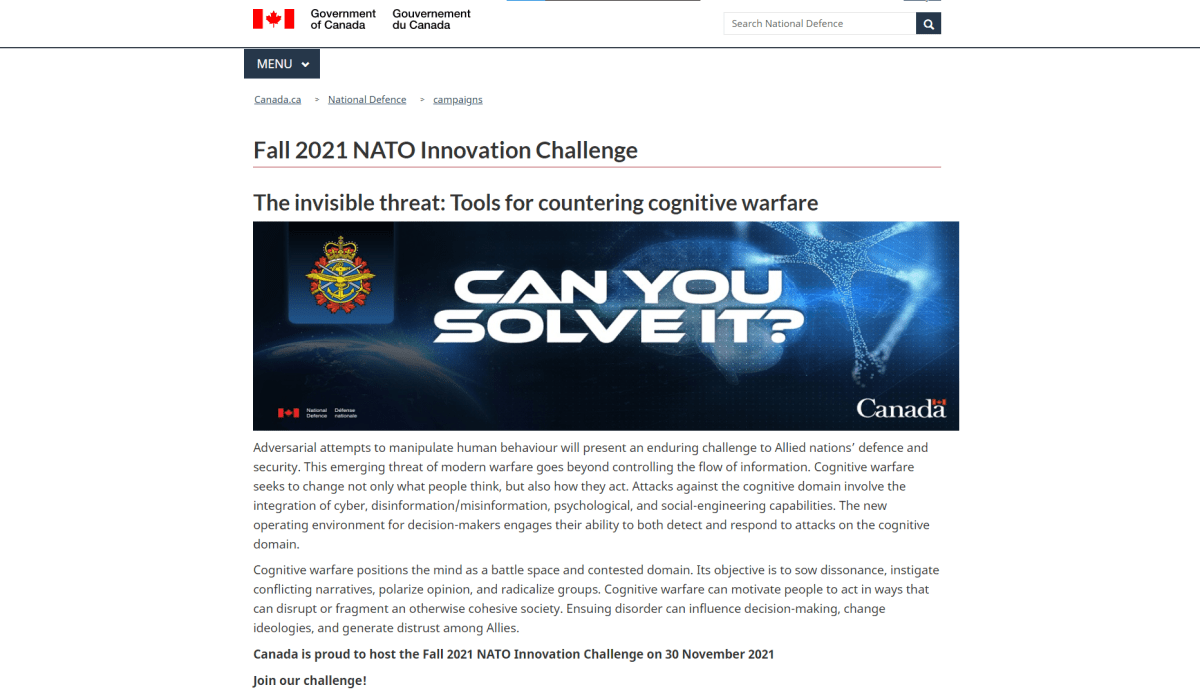
“Cognitive warfare seeks to change not only what people think, but also how they act,” the Canadian government wrote in its official statement on the challenge. “Attacks against the cognitive domain involve the integration of cyber, disinformation/misinformation, psychological, and social-engineering capabilities.”
Ottawa’s press release continued: “Cognitive warfare positions the mind as a battle space and contested domain. Its objective is to sow dissonance, instigate conflicting narratives, polarize opinion, and radicalize groups. Cognitive warfare can motivate people to act in ways that can disrupt or fragment an otherwise cohesive society.”
NATO-Backed Panel
An advocacy group called the NATO Association of Canada has mobilized to support this Innovation Challenge, working closely with military contractors to attract the private sector to invest in further research on behalf of NATO — and its own bottom line.
While the NATO Association of Canada (NAOC) is technically an independent NGO, its mission is to promote NATO, and the organization boasts on its website, “The NAOC has strong ties with the Government of Canada including Global Affairs Canada and the Department of National Defence.”
As part of its efforts to promote Canada’s NATO Innovation Challenge, the NAOC held a panel discussion on cognitive warfare on Oct. 5.
The researcher who wrote the definitive 2020 NATO-sponsored study on cognitive warfare, François du Cluzel, participated in the event, alongside NATO-backed Canadian military officers.
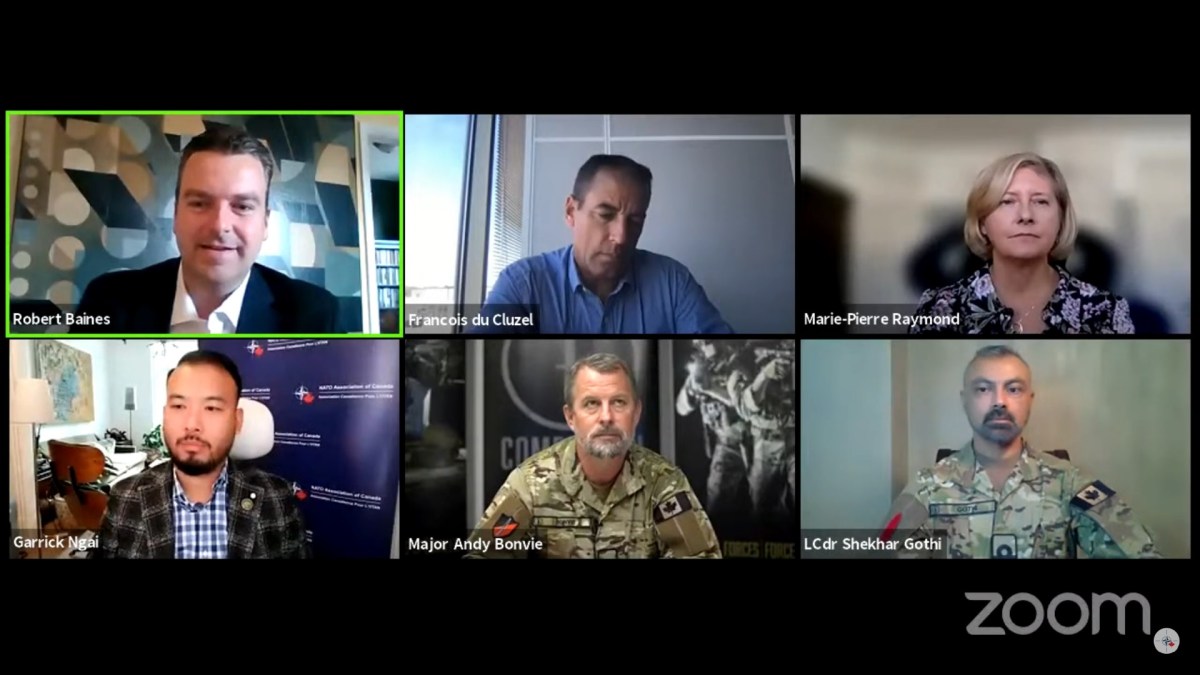
Oct. 5 panel on cognitive warfare, hosted by the NATO Association of Canada.
The panel was overseen by Robert Baines, president of the NATO Association of Canada. It was moderated by Garrick Ngai, a marketing executive in the weapons industry who serves as an adviser to the Canadian Department of National Defense and vice president and director of the NAOC.
Baines opened the event noting that participants would discuss “cognitive warfare and new domain of competition, where state and non-state actors aim to influence what people think and how they act.”
The NAOC president also happily noted the lucrative “opportunities for Canadian companies” that this NATO Innovation Challenge promised.
‘Ways of Harming the Brain’
The Oct. 5 panel kicked off with François du Cluzel, a former French military officer who in 2013 helped to create the NATO Innovation Hub (iHub), which he has since then managed from its base in Norfolk, Virginia.
Although the iHub insists on its website, for legal reasons, that the “opinions expressed on this platform don’t constitute NATO or any other organization points of view,” the organization is sponsored by the Allied Command Transformation (ACT), described as “one of two Strategic Commands at the head of NATO’s military command structure.”
The Innovation Hub, therefore, acts as a kind of in-house NATO research center or think tank. Its research is not necessarily official NATO policy, but it is directly supported and overseen by NATO.
In 2020, NATO’s Supreme Allied Commander Transformation (SACT) tasked du Cluzel, as manager of the iHub, to conduct a six-month study on cognitive warfare.
Du Cluzel summarized his research in the panel this October. He initiated his remarks noting that cognitive warfare “right now is one of the hottest topics for NATO,” and “has become a recurring term in military terminology in recent years.”
Although French, Du Cluzel emphasized that cognitive warfare strategy “is being currently developed by my command here in Norfolk, U.S.A.”
The NATO Innovation Hub manager spoke with a PowerPoint presentation, and opened with a provocative slide that described cognitive warfare as “A Battle for the Brain.”
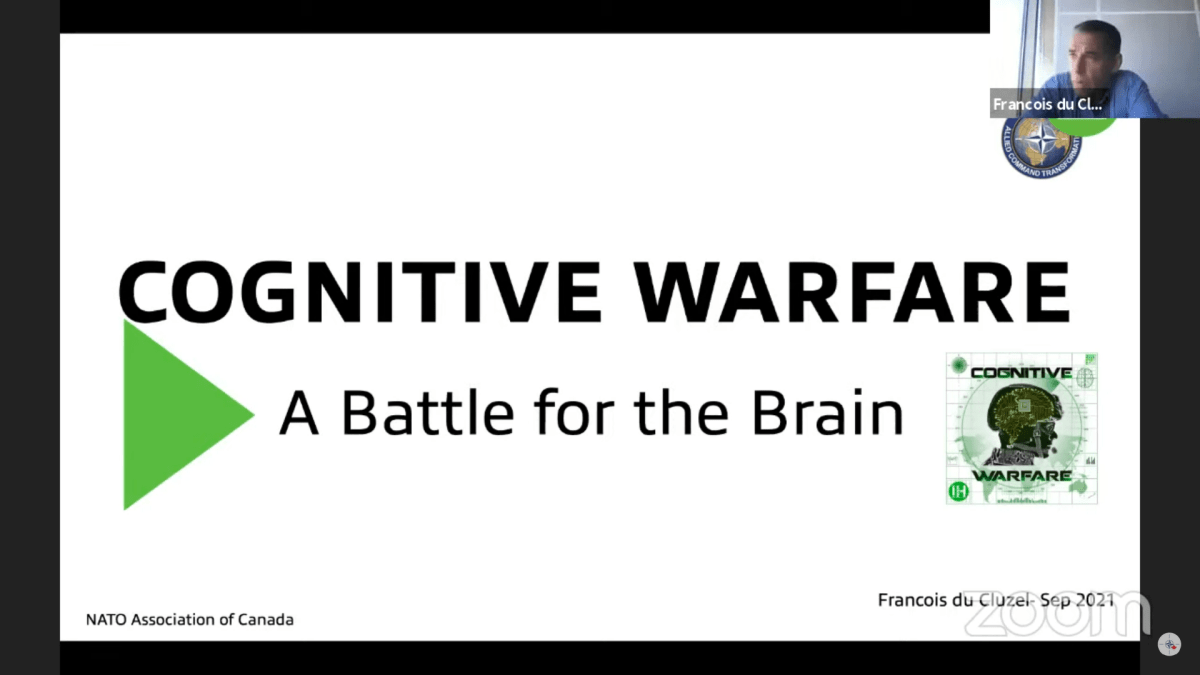 “Cognitive warfare is a new concept that starts in the information sphere, that is a kind of hybrid warfare,” du Cluzel said.
“Cognitive warfare is a new concept that starts in the information sphere, that is a kind of hybrid warfare,” du Cluzel said.
“It starts with hyper-connectivity. Everyone has a cell phone,” he continued. “It starts with information because information is, if I may say, the fuel of cognitive warfare. But it goes way beyond solely information, which is a standalone operation — information warfare is a standalone operation.”
Cognitive warfare overlaps with Big Tech corporations and mass surveillance, because “it’s all about leveraging the Big Data,” du Cluzel explained. “We produce data everywhere we go. Every minute, every second we go, we go online. And this is extremely easy to leverage those data in order to better know you and use that knowledge to change the way you think.”
Naturally, the NATO researcher claimed foreign “adversaries” are the supposed aggressors employing cognitive warfare. But at the same time, he made it clear that the Western military alliance is developing its own tactics.
Du Cluzel defined cognitive warfare as the “art of using technologies to alter the cognition of human targets.”
Those technologies, he noted, incorporate the fields of NBIC — nanotechnology, biotechnology, information technology, and cognitive science. All together, “it makes a kind of very dangerous cocktail that can further manipulate the brain,” he said.
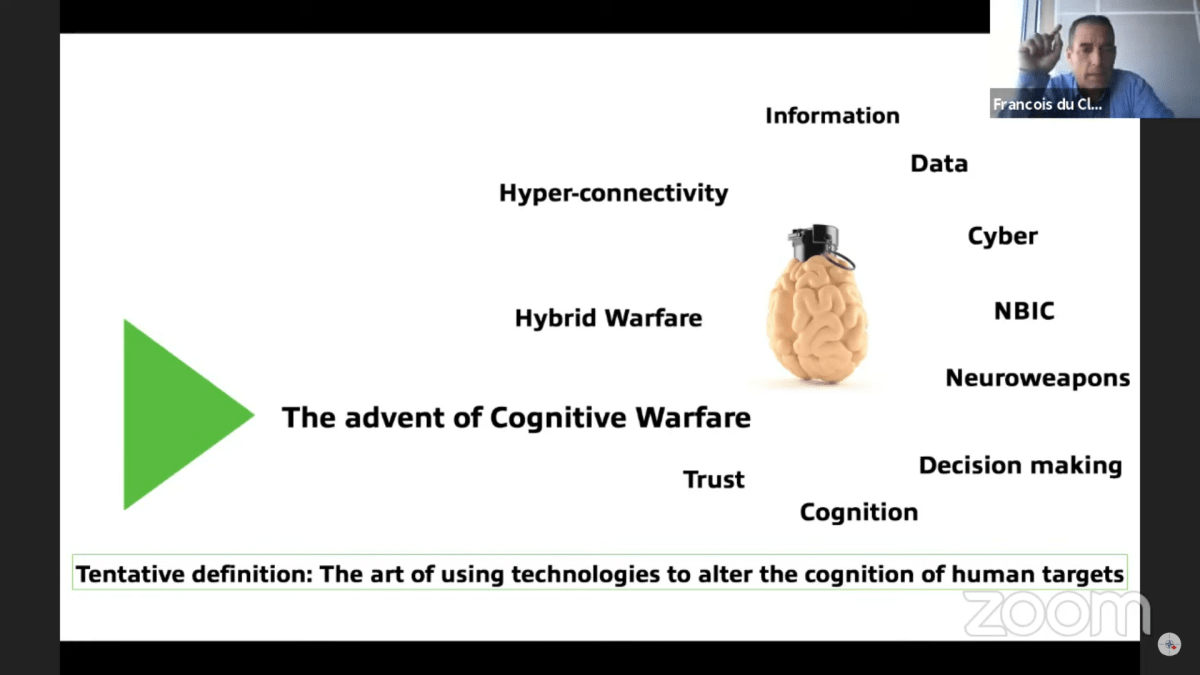 Du Cluzel went on to explain that the exotic new method of attack “goes well beyond” information warfare or psychological operations (psyops).
Du Cluzel went on to explain that the exotic new method of attack “goes well beyond” information warfare or psychological operations (psyops).
“Cognitive warfare is not only a fight against what we think, but it’s rather a fight against the way we think, if we can change the way people think,” he said. “It’s much more powerful and it goes way beyond the information [warfare] and psyops.”
De Cluzel continued:
“It’s crucial to understand that it’s a game on our cognition, on the way our brain processes information and turns it into knowledge, rather than solely a game on information or on psychological aspects of our brains. It’s not only an action against what we think, but also an action against the way we think, the way we process information and turn it into knowledge.
In other words, cognitive warfare is not just another word, another name for information warfare. It is a war on our individual processor, our brain.”
The NATO researcher stressed that “this is extremely important for us in the military,” because “it has the potential, by developing new weapons and ways of harming the brain, it has the potential to engage neuroscience and technology in many, many different approaches to influence human ecology… because you all know that it’s very easy to turn a civilian technology into a military one.”
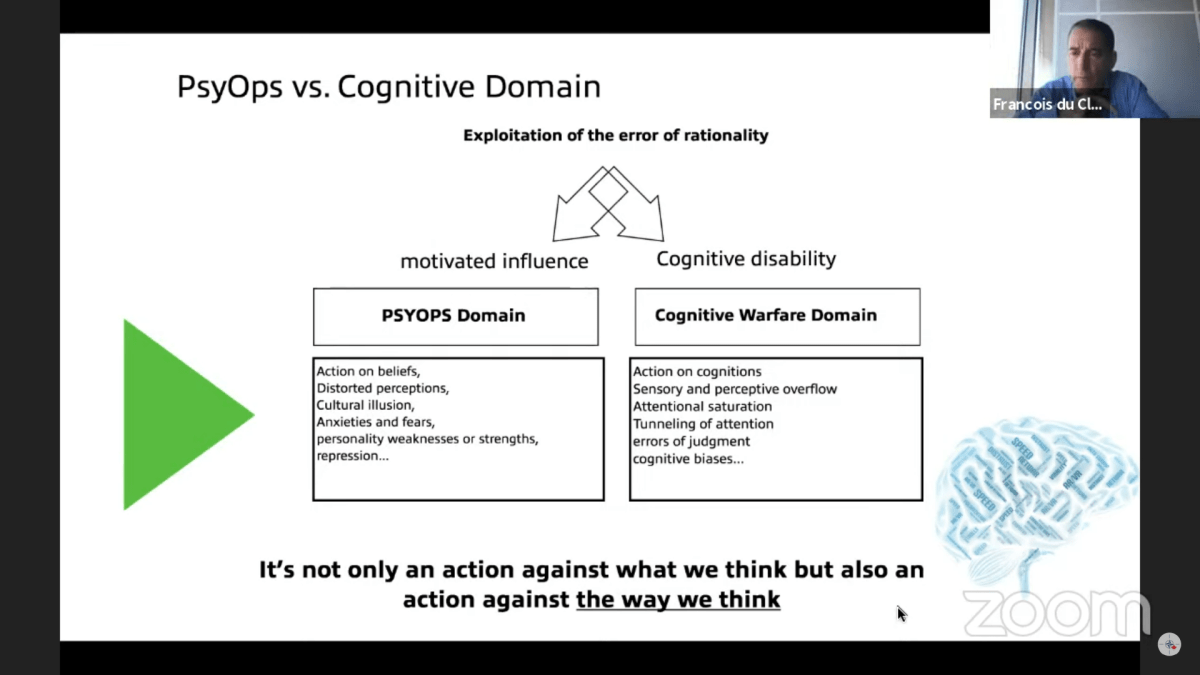
As for who the targets of cognitive warfare could be, du Cluzel revealed that anyone and everyone is on the table.
“Cognitive warfare has universal reach, from starting with the individual to states and multinational organizations,” he said. “Its field of action is global and aim to seize control of the human being, civilian as well as military.”
And the private sector has a financial interest in advancing cognitive warfare research, he noted: “The massive worldwide investments made in neurosciences suggests that the cognitive domain will probably one of the battlefields of the future.”
The development of cognitive warfare totally transforms military conflict as we know it, du Cluzel said, adding “a third major combat dimension to the modern battlefield: to the physical and informational dimension is now added a cognitive dimension.”
This “creates a new space of competition beyond what is called the five domains of operations – or land, sea, air, cyber, and space domains. Warfare in the cognitive arena mobilizes a wider range of battle spaces than solely the physical and information dimensions can do.”
In short, humans themselves are the new contested domain in this novel mode of hybrid warfare, alongside land, sea, air, cyber, and outer space.
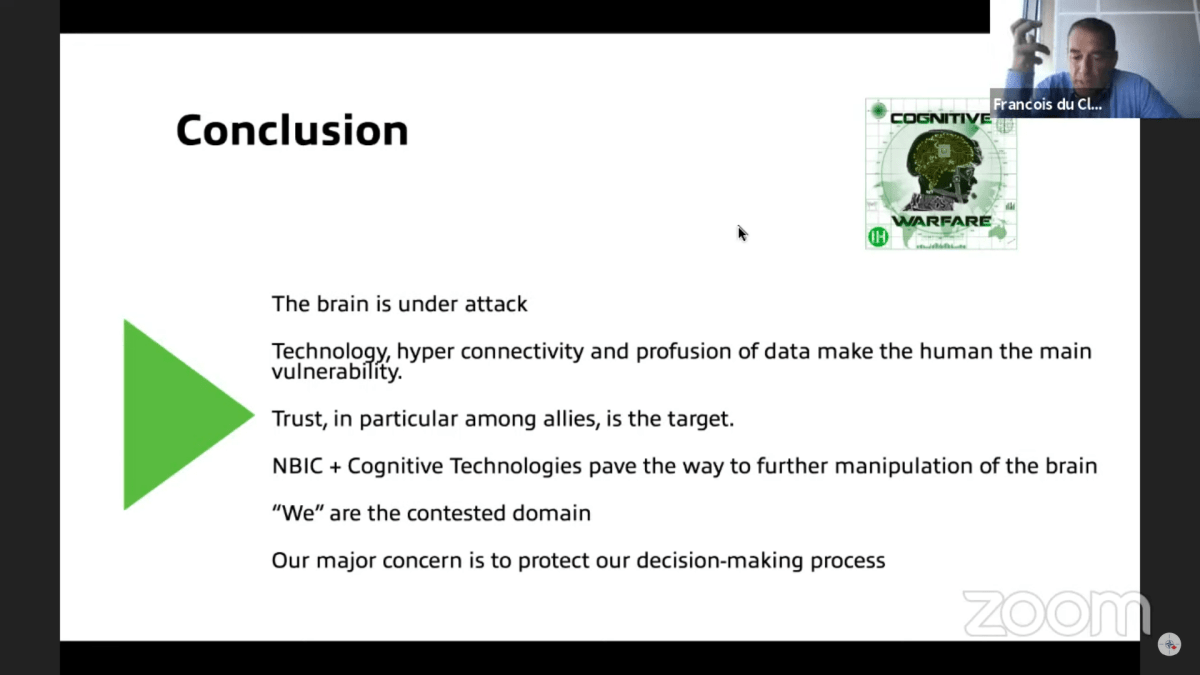
‘Embedded 5th Column’
The study that NATO Innovation Hub manager François du Cluzel conducted, from June to November 2020, was sponsored by the military cartel’s Allied Command Transformation, and published as a 45-page report in January 2021 (PDF).
It shows how contemporary warfare has reached the kind of dystopian stage, once only imaginable in science fiction.
“The nature of warfare has changed,” the report emphasized. “The majority of current conflicts remain below the threshold of the traditionally accepted definition of warfare, but new forms of warfare have emerged such as Cognitive Warfare (CW), while the human mind is now being considered as a new domain of war.”
For NATO, research on cognitive warfare is not just defensive; it is very much offensive as well.
“Developing capabilities to harm the cognitive abilities of opponents will be a necessity,” du Cluzel’s report stated clearly. “In other words, NATO will need to get the ability to safeguard her decision making process and disrupt the adversary’s one.”
And anyone could be a target of these cognitive warfare operations: “Any user of modern information technologies is a potential target. It targets the whole of a nation’s human capital,” the report ominously added.
“As well as the potential execution of a cognitive war to complement to a military conflict, it can also be conducted alone, without any link to an engagement of the armed forces,” the study went on. “Moreover, cognitive warfare is potentially endless since there can be no peace treaty or surrender for this type of conflict.”
Just as this new mode of battle has no geographic borders, it also has no time limit: “This battlefield is global via the internet. With no beginning and no end, this conquest knows no respite, punctuated by notifications from our smartphones, anywhere, 24 hours a day, 7 days a week.”
The NATO-sponsored study noted that “some NATO Nations have already acknowledged that neuroscientific techniques and technologies have high potential for operational use in a variety of security, defense and intelligence enterprises.”
It spoke of breakthroughs in “neuroscientific methods and technologies” (neuroS/T), and said “uses of research findings and products to directly facilitate the performance of combatants, the integration of human machine interfaces to optimise combat capabilities of semi autonomous vehicles (e.g., drones), and development of biological and chemical weapons (i.e., neuroweapons).”
The Pentagon is among the primary institutions advancing this novel research, as the report highlighted:
“Although a number of nations have pursued, and are currently pursuing neuroscientific research and development for military purposes, perhaps the most proactive efforts in this regard have been conducted by the United States Department of Defense; with most notable and rapidly maturing research and development conducted by the Defense Advanced Research Projects Agency (DARPA) and Intelligence Advanced Research Projects Activity (IARPA).”
Military uses of neuroS/T research, the study indicated, include intelligence gathering, training, “optimising performance and resilience in combat and military support personnel,” and of course “direct weaponisation of neuroscience and neurotechnology.”
This weaponization of neuroS/T can and will be fatal, the NATO-sponsored study was clear to point out. The research can “be utilised to mitigate aggression and foster cognitions and emotions of affiliation or passivity; induce morbidity, disability or suffering; and ‘neutralise’ potential opponents or incur mortality” — in other words, to maim and kill people.

Retired General Robert Scales in 2011. (C-Span)
The report quoted U.S. Major General Robert H. Scales, who summarized NATO’s new combat philosophy: “Victory will be defined more in terms of capturing the psycho-cultural rather than the geographical high ground.”
And as NATO develops tactics of cognitive warfare to “capture the psycho-cultural,” it is also increasingly weaponizing various scientific fields.
The study spoke of “the crucible of data sciences and human sciences,” and stressed that “the combination of Social Sciences and System Engineering will be key in helping military analysts to improve the production of intelligence.”
“If kinetic power cannot defeat the enemy,” it said, “psychology and related behavioural and social sciences stand to fill the void.”
“Leveraging social sciences will be central to the development of the Human Domain Plan of Operations,” the report went on. “It will support the combat operations by providing potential courses of action for the whole surrounding Human Environment including enemy forces, but also determining key human elements such as the Cognitive center of gravity, the desired behaviour as the end state.”
All academic disciplines will be implicated in cognitive warfare, not just the hard sciences. “Within the military, expertise on anthropology, ethnography, history, psychology among other areas will be more than ever required to cooperate with the military,” the NATO-sponsored study stated.
The report nears its conclusion with an eerie quote: “Today’s progresses in nanotechnology, biotechnology, information technology and cognitive science (NBIC), boosted by the seemingly unstoppable march of a triumphant troika made of Artificial Intelligence, Big Data and civilisational ‘digital addiction’ have created a much more ominous prospect: an embedded fifth column, where everyone, unbeknownst to him or her, is behaving according to the plans of one of our competitors.”
“The modern concept of war is not about weapons but about influence,” it posited. “Victory in the long run will remain solely dependent on the ability to influence, affect, change or impact the cognitive domain.”
The NATO-sponsored study then closed with a final paragraph that makes it clear beyond doubt that the Western military alliance’s ultimate goal is not only physical control of the planet, but also control over people’s minds:
“Cognitive warfare may well be the missing element that allows the transition from military victory on the battlefield to lasting political success. The human domain might well be the decisive domain, wherein multi-domain operations achieve the commander’s effect. The five first domains can give tactical and operational victories; only the human domain can achieve the final and full victory.”
Canadian Special Ops Officer
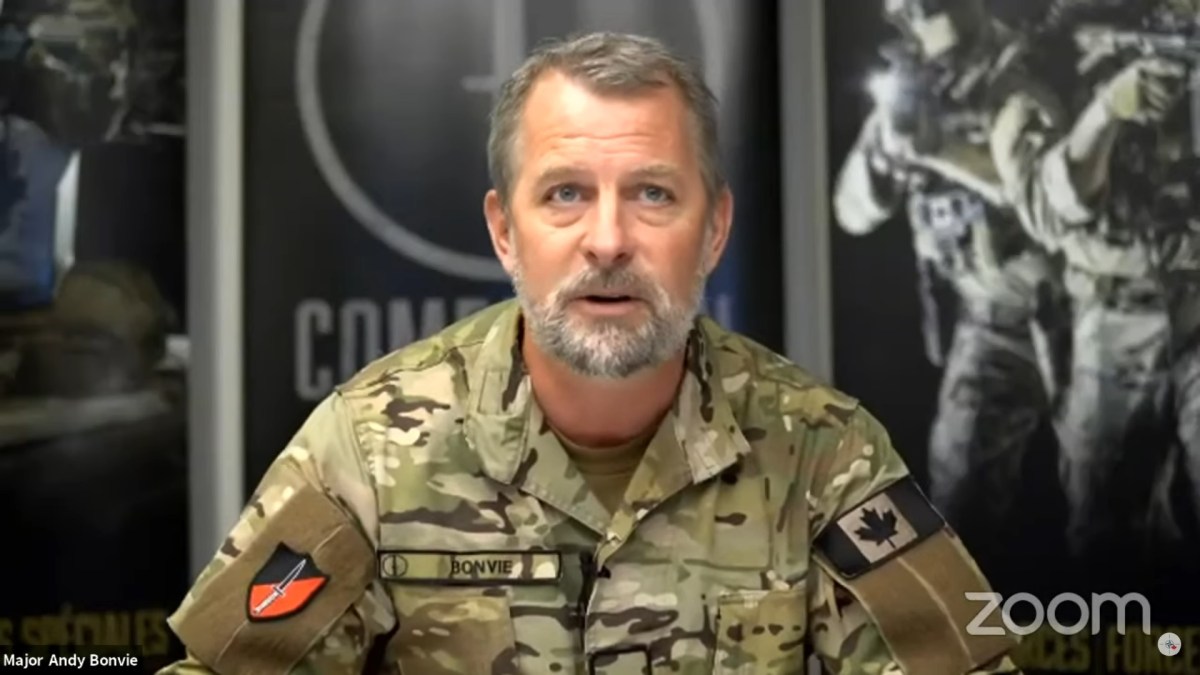 When François du Cluzel, the NATO researcher who conducted the study on cognitive warfare, concluded his remarks in the Oct. 5 NATO Association of Canada panel, he was followed by Andy Bonvie, a commanding officer at the Canadian Special Operations Training Centre.
When François du Cluzel, the NATO researcher who conducted the study on cognitive warfare, concluded his remarks in the Oct. 5 NATO Association of Canada panel, he was followed by Andy Bonvie, a commanding officer at the Canadian Special Operations Training Centre.
With more than 30 years of experience with the Canadian Armed Forces, Bonvie spoke of how Western militaries are making use of research by du Cluzel and others, and incorporating novel cognitive warfare techniques into their combat activities.
“Cognitive warfare is a new type of hybrid warfare for us,” Bonvie said. “And it means that we need to look at the traditional thresholds of conflict and how the things that are being done are really below those thresholds of conflict, cognitive attacks, and non-kinetic forms and non-combative threats to us. We need to understand these attacks better and adjust their actions and our training accordingly to be able to operate in these different environments.”
Although he portrayed NATO’s actions as “defensive,” claiming “adversaries” were using cognitive warfare against them, Bonvie was unambiguous about the fact that Western militaries are developing these techniques themselves, to maintain a “tactical advantage.”
“We cannot lose the tactical advantage for our troops that we’re placing forward as it spans not only tactically, but strategically,” he said. “Some of those different capabilities that we have that we enjoy all of a sudden could be pivoted to be used against us. So we have to better understand how quickly our adversaries adapt to things, and then be able to predict where they’re going in the future, to help us be and maintain the tactical advantage for our troops moving forward.”
‘Most Advanced Form of Manipulation’
Marie-Pierre Raymond, a retired Canadian lieutenant colonel who currently serves as a “defence scientist and innovation portfolio manager” for the Canadian Armed Forces’ Innovation for Defence Excellence and Security Program, also joined the Oct. 5 panel.
“Long gone are the days when war was fought to acquire more land,” Raymond said. “Now the new objective is to change the adversaries’ ideologies, which makes the brain the center of gravity of the human. And it makes the human the contested domain, and the mind becomes the battlefield.”
“When we speak about hybrid threats, cognitive warfare is the most advanced form of manipulation seen to date,” she added, noting that it aims to influence individuals’ decision-making and “to influence a group of a group of individuals on their behavior, with the aim of gaining a tactical or strategic advantage.”
Raymond noted that cognitive warfare also heavily overlaps with artificial intelligence, big data, and social media, and reflects “the rapid evolution of neurosciences as a tool of war.”
Raymond is helping to oversee the NATO Fall 2021 Innovation Challenge on behalf of Canada’s Department of National Defence, which delegated management responsibilities to the military’s Innovation for Defence Excellence and Security (IDEaS) Program, where she works.
In highly technical jargon, Raymond indicated that the cognitive warfare program is not solely defensive, but also offensive: “This challenge is calling for a solution that will support NATO’s nascent human domain and jump-start the development of a cognition ecosystem within the alliance, and that will support the development of new applications, new systems, new tools and concepts leading to concrete action in the cognitive domain.”
She emphasized that this “will require sustained cooperation between allies, innovators, and researchers to enable our troops to fight and win in the cognitive domain. This is what we are hoping to emerge from this call to innovators and researchers.”
To inspire corporate interest in the NATO Innovation Challenge, Raymond enticed, “Applicants will receive national and international exposure and cash prizes for the best solution.” She then added tantalizingly, “This could also benefit the applicants by potentially providing them access to a market of 30 nations.”
Call for Investment
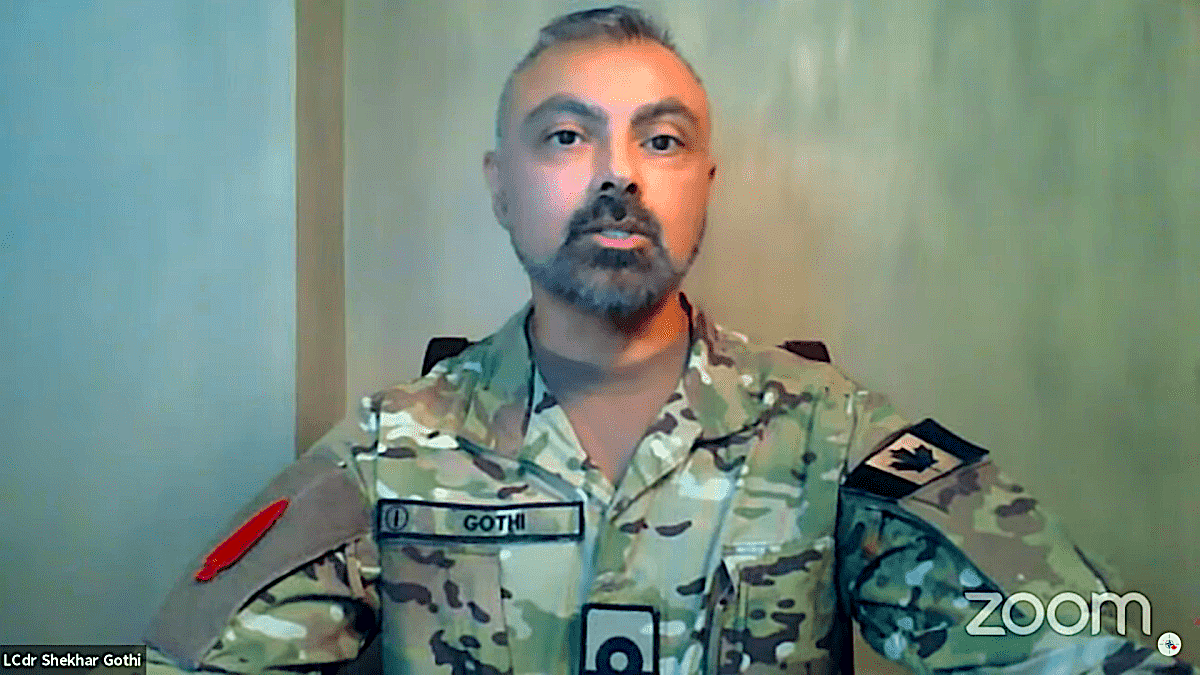 The other institution that is managing the Fall 2021 NATO Innovation Challenge on behalf of Canada’s Department of National Defense is the Special Operations Forces Command (CANSOFCOM).
The other institution that is managing the Fall 2021 NATO Innovation Challenge on behalf of Canada’s Department of National Defense is the Special Operations Forces Command (CANSOFCOM).
A Canadian military officer who works with CANSOFCOM, Shekhar Gothi, was the final panelist in the Oct. 5 NATO Association of Canada event. Gothi serves as CANSOFCOM’s “innovation officer” for Southern Ontario.
He concluded the event appealing for corporate investment in NATO’s cognitive warfare research.
The bi-annual Innovation Challenge is “part of the NATO battle rhythm,” Gothi declared enthusiastically.
He noted that, in the spring of 2021, Portugal held a NATO Innovation Challenge focused on warfare in outer space.
In spring 2020, the Netherlands hosted a NATO Innovation Challenge focused on Covid-19.
Gothi reassured corporate investors that NATO will bend over backward to defend their bottom lines: “I can assure everyone that the NATO innovation challenge indicates that all innovators will maintain complete control of their intellectual property. So NATO won’t take control of that. Neither will Canada. Innovators will maintain their control over their IP.”
The comment was a fitting conclusion to the panel, affirming that NATO and its allies in the military-industrial complex not only seek to dominate the world and the humans that inhabit it with unsettling cognitive warfare techniques, but to also ensure that corporations and their shareholders continue to profit from these imperial endeavors.
Ben Norton is a journalist and writer. He is a reporter for The Grayzone, and the producer of the “Moderate Rebels” podcast, which he co-hosts with Max Blumenthal. His website is BenNorton.com, and he tweets at @BenjaminNorton.
This article is from The Grayzone.
The views expressed are solely those of the author and may or may not reflect those of Consortium News.
Please Support Our
Fall Fund Drive!

 By
By 
Note to the warmongering NATO crowd: If your lives revolves around figuring out how to weaponize and warp a human being’s God-given critical thinking skills and agency, you have become psychopaths. Might wanna check that and ask yourselves if your part of the problem or the solution. (Not the final solution, which is where you seem to be headed with this s#!t.)
Sounds like NATO has learned something from Trump about just how stupid and ignorant some Americans are, especially the spoiled privileged ones.
Or is it that the CIA has infiltrated NATO militaries and and sold them a very similar line they been selling in the U.S. for the last seventy years.
Never forget what Smedly Butler said on the subject of rackets and war, this was in 1930, he toured the country speaking on the subject. The difference now is that it is not only the industrialists that benefit. Far from it.
I strongly suggest everyone read the War is A Racket wiki. Should take a person only a minute of two and it will be a minute or two filled with wisdom.
Note: Especially see the summary.
His personal wiki is longer but worth reading also. Major Gen. Butler seems to have been a thinker who did not suffer fools lightly.
Creepy as hell, but I’d probably worry more about the dumbing down of Americans. That is, they aren’t a competitor’s fifth column, they are just uneducated morons, so any jerk like Trump can “manipulate their cognitive domain” with, not biotechnological nanotechnology, but rather some jingoistic propaganda at a rally or whatever. Hell, look at how fast people have already forgotten about the Facebook scandal and lying.
Da Rehearsal is now Over.
A return to sanity? Sanity will not be restored for us by others. We are the ones that must restore it. We cannot wait for others to be brave on our behalf. We are here in this initiatory moment to choose who we are. The choice of whether to capitulate or to act is a declaration: Who am I to be? What is the world to be? Am I serious enough about my vision for the world to risk my security for it? That is not a challenge meant to goad myself into action. It is simply true. Through my choice, I will know myself as I am. I will become as I choose. The rehearsal is over.
* * *
Many people trust the authorities and willingly comply with their rules. They face no dilemma, no initiatory moment, no self-defining world-creating choice point, not yet.
But as the authorities’ narratives devolve into absurdity and their rules devolve into oppression, more and more of us face this choice:
To live your truth out loud, or
To live by a lie, consoling yourself with secret protest.
To do what you know is right, or
To cave in to the pressure, consoling yourself with words you don’t believe. “I had no choice.”
Yes, for many of us it has come to such a choice. The rehearsal is over.
* * *
Maybe, I think, maybe now is not the time to be brave. Maybe now is not the time to speak out. I’ll wait until it is a little safer.
But it will never be safe to be brave. Never.
If not now, when? If not I, who?
Shall I wait for others to do what I dare not do? We are ready. we’ve been preparing and being prepared for a long time. The rehearsal is over.
Perhaps u r NATO???
This is probably the most terrifying thing I’ve read this month. Maybe this whole year, maybe ever. Holy fuck. Where does one even begin?
One would think that after the last twenty years of killing and the recurring nightmare nuclear war everyone would have learned some lessons about the killing of the “Other”.
I have this thought every time any country,especially the U.S. launches another nuclear sub. Which leads the Chinese to build another more powerful ICBM of super sonic cruse missile. And so on. This a madness perpetuated by mostly by U.S. advance after advance in the technology of death. Which just as soon as can be arranged is sold to country A. B or C, and the whole insane process starts over.
This is not sustainable and we are about to learn this. This bull needs to cease ASAP if not sooner.
The military is increasingly resembling an autoimmune disorder.
NATO has too much money and too nany idling people. At this point they are looking for new wars since there is no real war to justify their budget level. The military expenditures should be reduced when there is no threat other than imaginary scenarios … unless they have hidden plans to create trouble in Asia. Hacking the brain sounds more like some form of terrorism than anything else: Who would vote for that proposition if it was the object of a referendum?
Don’t say that too loud Richard. Right wingers seem to love anything that is counter productive and destructive of the “Other”.
One might say that these innovative warriors are thinking about developing techniques to actually “drive people crazy” taking advantage of the interconnections (sense of belonging and group identification and other hierarchy of needs based on basic human nature) provided by current communication and information accessing technologies. Almost 50 years ago the U. S. federal government was financing training and development of innovative methods for the treatment of mental illnesses (often institutional behaviors) that would fundamentally change the institutional culture of mental hospitals. I was one of those selected student therapists who demonstrated during the weeks of the most advanced training that the management of group dynamics can achieve amazing and unexpected results, even shocking the trainers (top authorities). So, these government officials should be aware that their “partners” in the private sector could social engineer operations that will shock them if they do not have full intelligence of the motives and operations of their partners in whom they have given their Trust.
Sounds like nothing more than a new way for unscrupulous people with some Internet skills to divert “Defense” cash into their coffers. I mean, if the war is for the minds of Americans, that one is over. Americans believe every “Russia did it” story they hear, and they denounce anyone who’s aware of the CIA’s role in the 60s assassinations as mentally ill. Outlets like ConsortiumNews devoted to unearthing the truth from beneath the mountain of national security state lies have been branded as purveyors of Russian disinformation, and my Democratic friends take great pleasure in the McCarthyite smears being leveled at the contrarian voices of the anti-war crowd. Lies are truth, and the truth is Russian disinformation.
The assurances given corporations for their “intellectual property rights” speaks volumes to your point about yet another source to fill the coffers of the diabolical. The fundamental flaw in their logic is how many people are more unplugged than they imagine. Short of surgery to implant nano technology or irradiating our brains directly or wiping us literally off the face of the planet, much of their technology relies on us being glued to our screens and the sources they want us to connect with. Granted, no small number give them just what they wish in this regard, but much of the world’s population is much less connected than we western fools are who can’t live without it.
The largely unconnected Amish educate to the 8th grade. I often wonder if they aren’t on to something there. We the bright, clever, intelligent sort are educated right into stupidity.
Frightening! Can we be certain that the winners of the Innovation Challenge in cognition warfare will not have rigged the competition in their favor by taking control of the judges’ minds?
This will really blow up in their faces. Most Americans already don’t trust the MSM and we already have a polarized society that is barely functional. Let’s make that worse. What could go wrong?
And the first human targets are… the functionaries that hold the purse strings, and the first strategic objective is developing a new and robust revenue stream.
Somewhere in there it talked of the willingness of many to bend over backwards to advance this: many are already willing to bend over forward, as long as there’s money in it.
If the entire programs don’t contain anything more than the vague generalities and hazy promises reported here, we don’t yet have much to worry about, except the warped cognitive degeneracy of the those that have succumbed to this. Were there any specific programs or operations discussed? Any specific advances in cognitive research that they specifically have “hopes” for? I don’t want to be dismissive, but what is reported here sounds mainly like sales hype, bordering on hucksterism.
Wow!! How Orwellian is this??? Shame the article is so long most readers won’t make it all the way through.
The whole thing describes a conversation by elites about the next .com boom. On a burning planet with flooded boundaries, cognitive warfare will be the last thing needed for survival. A hundred years ago, cognitive warfare was called a lobotomy. Coming up with a new brand name shows a willing lack of cognitive ability. Sounds like a lot of L. Ron Hubbard acolytes.
Call for Investment
The other institution that is managing the Fall 2021 NATO Innovation Challenge on behalf of Canada’s Department of National Defense is the Special Operations Forces Command (CANSOFCOM).
A Canadian military officer who works with CANSOFCOM, Shekhar Gothi, was the final panelist in the Oct. 5 NATO Association of Canada event. Gothi serves as CANSOFCOM’s “innovation officer” for Southern Ontario.
He concluded the event appealing for corporate investment in NATO’s cognitive warfare research.
——-
A benign possibility is that they aim to divert military spending, at least a part, toward useless mumbo-jumbo research that will result in incontrovertible proofs that they need yet more money. But some wacky and harmful experiments are possible under those vague labels, things like that happened before.
Evolution not revolution.